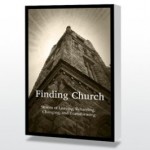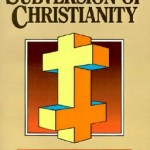When I left the church for good…
This post is part of a short series based on Jeremy Myer’s (from “Till He Comes“) book project “Finding Church.” Jeremy asked for contributions in the categories of Changing Church, Leaving Church, Reforming Church, and Returning to Church. As I worked through my own contribution, I realized that my story could fit into any of the categories. So, I’m writing a post based on each category.
This post describes when I “left church.” This is how Jeremy describes this category: “These are stories of people who felt that ‘going to church’ was inhibiting their walk with Jesus, and so left the institutional church to follow and serve Jesus in other ways.”
Of course, I already told most of this story in my previous post about “changing church.” But, in this post, I’m able to point out what I’ve “left.” Because, as I explained in that previous post, I didn’t leave the church – it’s impossible to leave the church that God is putting together once he places someone among his family.
However, I did leave “the church” – that organizational, institutional, locational version. This is the entity or location that people refer to when they ask questions like, “Where do you go to church?” or “What did you do in church today?” or “Have you joined our church yet?”
I’ve left the programs and the hierarchies and the vocations and the positions and offices.
The church is not a place that someone can go to, nor is it an event that someone can attend, nor is it an organization that someone can choose to join or not.
The church is the family of God, the body of Christ, the dwelling place of the Holy Spirit. I’m still part of that church, and I always will be. If you are in Christ, then you are part of that church with me.
It’s the other “church” that I left. And, guess what? There are people who remain part of that “church” who are also part of the church with me. Even if they never leave “the church,” they remain part of the church of God by identity, in the same way that I’ve always been part of that church and will always be part of that church.
So, I’ve left “the church.” But, in a way, my heart remains tied (through mutual relationship with God) to the hearts of those who are still part of “the church” – in the same way that my heart is tied to all who are part of God’s family.
When I changed churches…
This post is part of a short series based on Jeremy Myer’s (from “Till He Comes“) book project “Finding Church.” Jeremy asked for contributions in the categories of Changing Church, Leaving Church, Reforming Church, and Returning to Church. As I worked through my own contribution, I realized that my story could fit into any of the categories. So, I’m writing a post based on each category.
This post describes when I “changed church.” This is how Jeremy describes this category: “These are stories of people who, for numerous different reasons, left one church to join another.”
Now, I grew up as part of various different “churches.” In reality, each of these was a organization, not the church. Don’t misunderstand me… the church was there – the people of God were present – but what I understood as “church” was actually the organization, not the people.
During that time, I “changed churches” many times and for different reasons. Usually, we “changed churches” because we moved. Only a few times we “changed churches” even though we stayed in the same city. Interestingly, we never “changed churches” because of problems with leadership.
In reality, I was really changing organizations. I was leaving one organization to be part of another organization. Of course, I was also breaking relationships with part of God’s family and inserting myself and my family into the lives of other people who are part of God’s family. But, I didn’t really see either one was the church.
But, a few years ago, I changed “church” for the last time. Why? Because my understanding of what the church is changed. It’s not an organization that can be joined or left. Church is the people of God, saved by faith in Jesus Christ, indwelled by the Holy Spirit, and gathered together by God according to his grace and purposes.
When I’m with the people of God, I’m part of the church with them. And, in fact, we are members together of the body of Christ whether we realize it or accept it or not. Our relationship with one another and our identity as the church of God does not depend upon our decision. Instead, it depends completely on God. We simply interact with one another as directed by the Spirit to help one another grow and mature in our walk with Jesus Christ.
So, a few years ago, I changed to a different church for the last time. I changed from “church” as an organization to church as the people of God. Actually, I have always been part of this church, even though I didn’t understand it. And, I will always be part of that church.
What about you? Have you changed churches?
Guest Blogger: Humanistic Discipleship
I’ve invited several people to write “guest blog posts” for this blog. There are several reasons for this: 1) To offer different perspectives. 2) To generate even more discussion and conversation between blogs. 3) To introduce other bloggers to my readers.
(If you are interested in writing a guest blog post, please contact me at aknox[at]sebts[dot]com.)
Today’s post was written by Ross Rohde. You can connect with Ross via his Facebook profile, Twitter (@rossrohde), or his blog “Viral Jesus.” Also, check out the microsite for his book Viral Jesus.
——————————————-
Humanistic Discipleship
In my book Viral Jesus in Chapter Eight: Viral Discipleship I note:
Today much of Christian activity seems to originate with human plans, and it is then carried out in human strength, with human results. It has nothing to do with the kingdom of God. The world does not need any more religion! It needs Jesus Christ. Religion is people’s attempts to do God’s work in their own strength. Jesus wants us to live and walk in God’s strength. God is only interested in His work, not our work. He oversees and empowers those things that originate in His heart. On judgment day, only that which was birthed and sustained by the Holy Spirit will survive.[1]
Merriam-Webster online dictionary defines humanism as “a doctrine, attitude, or way of life centered on human interests or values; especially: a philosophy that usually rejects supernaturalism and stresses an individual’s dignity and worth and capacity for self-realization through reason.”[2]
Most Western Bible-believing Christians are behaving as humanists. Yet most, if they are aware of humanism as a philosophy, would be offended by the idea that they are humanists. However, if we disdain the words, yet still behave like a humanist, we are a humanist.
The basic issue of humanism is that humans make the decisions and cause things to happen by their own will and ability, using their own rational intellect. We may do this for the best of intentions, but since we started from the wrong place and are functioning with the wrong operating system, we end up in a very desperate situation. We are lost in the woods thinking we know where we are going. All the time we are moving farther and farther away from home, away from God.
We have brought this same humanism into discipleship. Hence we focus on such things as witnessing techniques, small group dynamics, and biblical doctrine. None of these things are wrong, in and of themselves. The problem is the source of our accomplishment. We aren’t asking some prior questions. Rather than asking what is a good technique of sharing the gospel, perhaps we should ask: Did God set up this witnessing situation? How is He leading us to share the gospel? Instead of asking how can I utilize good small group dynamics to lead this group, perhaps we should ask how is God leading in the small group? Through whom does He want to minister? Instead of asking what doctrine is this Bible passage teaching, perhaps we should ask how is God ministering to us through the Bible? How is the Holy Spirit activating the truth of the Bible into our lives though His power?
For more on this subject read Chapter 8 of Viral Jesus.
- Is it possible to do good things with the best of intentions and still end up “lost in the woods thinking we know where we are going?”
- Do you believe God can actually lead the discipleship process, or is that our job?
- Can we do God a favor?
- If God leads discipleship, does that mean we have any involvement beyond being automatons? Is there any room for our creativity and thoughts?
[1] Brother Yun, Living Water, (Grand Rapids, MI: Zondervan, 2008), 54.
[2] Merriam-Webster Online, s.v. “humanism,” http://www.merriam-webster.com/dictionary/humanism (accessed July 20, 2009).
Review of Viral Jesus by Ross Rohde
A few weeks ago, I received (for free) a copy of Viral Jesus: Recovering the Contagious Power of the Gospel by Ross Rohde. I’ve had several opportunity to interact with Ross on his blog and on Facebook, and since I began to read his book, we’ve communicated a few times via email. I share that with you to tell you that I’ve always found Ross approachable and easy to understand. This book is no different.
Ross divides his book into three parts. In the first part – Chapters 1-3 – he describes what he means by a viral Jesus movement. In the second part – Chapters 4-7 – Ross lays out the historical background for the loss of this contagious gospel, describes several near-misses to viral movements, and describes a modern-day viral movement in China. In the final part – Chapters 9-10 – he describes some practical aspects of a viral Jesus movement in discipleship, church planting, and evangelism.
According to Ross, a viral Jesus movement is based on two things: 1) Jesus is Lord, and 2) the new covenant as the “operating system.” Everything should be run through these two “tests” to determine if it is within the realms of a viral Jesus movement. “Jesus is Lord” is set against any kind of human control, and a “new covenant operating system” introduces the new covenant with God through Jesus Christ as the core of our relationship with God and with one another.
I have read several books in which the author discusses these same issues. However, a few things set Ross’ book apart. First, I greatly appreciate the addition of the historic background and comparisons with several historic groups/movements. Also, I particularly enjoyed the combination of scriptural exegesis, theory, and real life examples.
Of the three sections of the book, the third one (the practical section) was by far the best to me. People need these kinds of explanation because the church has set the practical aspects of following Jesus (such as discipleship, church planting, and evangelism) in institutional forms and methodology for too long. Instead, Ross explains how these things work simply and through our relationships as they are empowered by the Holy Spirit.
I found the chapter on “church planting” to be the most challenging, although, like Ross, I dislike the term “church planting” (at least, if I understood him correctly). He follows Luke 10 as a pattern for taking the gospel to new households or spheres of influence.
I also think that his discussion of evangelism is excellent. I especially like the way Ross describes “effective” evangelism and how evangelism can be 100% effective 100% of the time.
I’m not convinced about some of the historical conclusions that Ross drew. Also, while I agree that some are gifted at apostleship (etc.), I do not think they are the only ones who should be opening up new spheres of influence to the gospel. Instead, I think his pattern for evangelists should be applied to all spiritual gifts (that is, that evangelists should evangelize but also equip others to evangelize).
The biggest concern that I have with this book – and with any book for that matter – is that the concepts in this book are best taught face-to-face, life-to-life. In fact, that is one of the reasons that I contacted Ross. For now, if the people around us are not living this kind of life, then our only option is “trial-and-error,” without the kind of living examples that we find offered in Scripture and that we see described in Ross’ book.
I highly recommend this book, and I’m looking forward to sharing my copy with some friends.
The Church: Not an ideal but a divine reality
Recently, a friend of mine returned my copy of Dietrich Bonhoeffer’s Life Together: The Classic Exploration of Faith in Community. I’ve read the book a couple of times, and my friend had asked me if he could borrow it. To be honest, I had completely forgotten that I had given it to him.
But, when my friend returned the book, I decided to read through it again. Early in the first chapter, I ran across a paragraph that I know that I had read several times. But, this time, it caused me to stop and think and think some more. As a matter of fact, I’ve been thinking about this paragraph for the last week or so.
This is the paragraph that I’m talking about, the first paragraph in a section titled “Not an Ideal but a Divine Reality”:
Innumerable times a whole Christian community has broken down because it had sprung from a wish dream. The serious Christian, set down for the first time in a Christian community, is likely to bring with him a very definite idea of what Christian life together should be and to try to realize it. But God’s grace speedily shatters such dreams. Just as surely as God desires to lead us to a knowledge of genuine Christian fellowship, so surely must we be overwhelmed by a great disillusionment with others, with Christians in general, and, if we are fortunate, with ourselves.
Our dreams and designs are NOT community in Christ. This point that Bonhoeffer is making is so important for our life in Christ and for our life with one another.
The reality in Christ is that we are broken people, and any designs or dreams that we place on community in Jesus Christ will be broken as well – even and especially when it looks perfect to us. What we design will always reflect us, not God.
However, God places broken people together – people who should never be able to share life together. This reality, as Bonhoeffer says, God shatters by his grace. Doesn’t that sound strange? God shatters our idealistic dreams of community by placing us among real people… this is his grace.
So, what is this “knowledge of genuine Christian fellowship” that Bonhoeffer talks about in the middle of this passage about real, divine community (not ideal community)? It is just that – sharing life in the midst of real, divine, broken, overwhelmed, hurting, disillusioned, wrong, selfish, unloving, stressed, messy community. When we can fellowship with one another IN SPITE of our brokenness and THROUGH Jesus Christ only (not our designs or dreams), then we are living in community in Jesus Christ.
Community in Christ is realized among those with whom we should not have community. It’s similar to what Jesus said in the Sermon on the Mount. Even those who are not God’s children know how to love people who love them back. But, God’s children love those who hate them, who persecute them, who curse them. God’s children fellowship with those who are different than them, who disagree with them, who are disillusioned with them.
Why? Because God’s children seek community and fellowship ONLY in Jesus Christ… and everything else is allowed to fall away.
Would you like to help write a book about the church?
Jeremy at “Till He Comes” is putting together a book about the church. He tells us more about his plans in a post called “You Can Help Write a Book on Church.”
I took part in a similar project last year, contributing a chapter to the book The Practice of Love. I enjoyed the process, so I thought I would let my readers know about this opportunity.
So, what kind of contributions is Jeremy looking for? Well, you can find out more detail by jumping to his post “You Can Help Write A Book on Church,” but here is part of what he says:
We encourage you to shape your submission to fit within one of these categories.
Leaving Church
Stories about personal life adjustments, theological changes, or church moral failures which led people to leave church for good.Returning to Church
Stories about people who used to attend church years ago, but stopped for a while, and have now decided to start attending again. These stories explain why they left, and what caused them to return.Reforming Church
Though many people are leaving the church and criticizing how church is done, some people want to stay within their church and be part of the solution. These stories relate what problems exist in the church, and how the person is seeking to reform and renew the church from within.Changing Church
Many people leave one church to attend another. Sometimes they attend a similar church across town; other times the new church is a completely different denomination, or form of church, such as going from a mega-church to a house-church. These stories reveal what moves the person made, and why they changed churches.
Am I going to take part? Perhaps. I have a few things going on, but I’m hoping to contribute to the topic “Reforming Church.”
If you were to write for this project, which category (or categories) do you think you would contribute to?
The best two books of 2011 (by default)
Every year since I started blogging in 2006, I’ve chosen a “best book” of the year. I’ve already had two criteria for choosing those books: 1) it had to be a book that I read for the first time that year and 2) it had to be a book about the church. (I mean, this blog is about the church, right?)
But, this year, by plan and by design, I decided to not read new books about the church. (I did read a few books that I had already read, and I read excerpts from other books.)
It wasn’t until recently that I recognized how this plan would affect my ability to choose a “best book” of 2011. However, it turns out that I DID read 2 books at the beginning of the year before my self-imposed “sabbatical” on new books about the church. I’ve decided to name both of those books as the “best two books of 2011.”
Here they are in no particular order, along with links to and excerpts from my original reviews:
To Transform a City: Whole Church, Whole Gospel, Whole City by Eric Swanson and Sam Williams
(Also, see my post “The Whole Church = All Church Leaders?” which discusses one aspect of this book.)
Overall, though, this book presents several concepts that are important for all believers to understand. When believers work together with brothers and sisters in their neighborhood (whether they are part of the same “local church” or not), then their neighborhood will be transformed. The same could be said for workplaces, schools, etc. They do not have to wait for church leaders to organize projects. They can start working together right now.
The Next Christians: The Good News About the End of Christian America (with a second subtitle: How a new generation is restoring the faith) by Gabe Lyon
I would recommend The Next Christians, especially to two groups of Christians. If you consider yourself one of “The Next Christians,” this book will be an encouragement and a challenge for you to live for Christ focusing on the gospel. If you do not consider yourself a “Next Christian,” and perhaps even wonder why so many people are changing a good thing, this book will help you see these new Christians from their perspective.
And, finally, if you’re interested, here are links to my “best books” of 2010, 2009, 2008, 2007, and 2006.
Community in Christ develops as we serve together
Dave Black announced yesterday that he is putting the finishing touches on a new book called Will You Join the Cause of Global Missions? If you read Dave’s blog, you know that he and his wife have been focused on proclaiming the gospel and strengthening the church in various countries around the world for the last several years. They do not do this work through any kind of missions organization, although they gladly work with many such organizations. Instead, they go around the world at their own expense, and they are including other believers in several churches around them in their efforts. (I know this first hand because I traveled with them to Ethiopia just over a year ago.)
In announcing his book, Dave shared a quote that I hope you will find encouraging and challenging (see the entry from Sunday, November 20, 2011 at 8:54 a.m.):
Jesus’ disciples enjoyed community simply because Jesus and not a set of dogmas was at the center of their life. They never tried to “build community.” They didn’t have to. Community was the result of being united in the Christian mission; community emerged naturally when they committed themselves to something bigger than themselves. And so it is in the church today. It is my personal observation that most Christians begin to enjoy genuine community only when they begin to serve the poor, evangelize the lost, and plant churches. The glue that unites them is the missional task of loving their neighbors. A shared sense of mission drives them to community. Their congregations are mission-shaped. Like Jesus, they literally go. For them the Bible, not tradition, is normative, and they hold themselves accountable to each other in love even while they work closely with the surrounding neighborhood, developing strong links between Christians and not-yet Christians.
If you have read much about the “missional” movement or about missions especially in the United States, you know that many (perhaps most?) efforts are quite sectarian in the sense that people tend to work together only with those who agree with them (on whatever “doctrines” they consider to be most important).
Dave’s statement above flies in the face of that practice. If he is correct – and I think he is – community in Christ is developed as we serve others in Christ’s name by proclaiming the gospel, building up other Christians (discipleship), and serving the least. Many today say that we cannot work in these ways (or at least in some of these ways) with other Christians with whom we disagree. I think this shows a desire (intentional or not) for community based on our interpretations instead of community based on Christ.
Certainly there will be difficulties and issues related to working with those who disagree with us especially concerning those beliefs that we hold dear. However, according to Jesus, our unity (even unity in mission) is important – perhaps necessary – in order for the world to know that Jesus Christ came from God the Father. (John 17:20-21)
Practically, how do we serve (in the various ways mentioned above) with brothers and sisters in Christ who disagree with us?
Worship, Jesus Christ, and Gathering with the Church
Several years ago, when I was still in the middle of my MDiv studies at Southeastern, two books in particular were very influential on me. The books were not necessarily influential on my thoughts and understanding about God or the church. Instead, these two books and authors helped me realize that it was possible to present what I was learning about the church in an academic or scholarly manner.
Those two books were Paul’s Idea of Community by Robert Banks and Engaging with God: A Biblical Theology of Worship by David Peterson. I still count these two books among my favorites. Recently, I was reading through Peterson’s conclusion, and I found these two paragraphs:
The uniqueness and total adequacy of Christ’s work is obscured by any doctrine of human priesthood, charged with some form of sacrificial ministry in the Christian congregation. There are no special buildings where God is especially present in the gospel era. There is no divinely ordained ritual of approach to God for believers under the new covenant. Nevertheless, several texts suggest that God presences himself in a distinctive way in the Christian meeting through his word and the operation of his Spirit.
The purpose of Christian gatherings is the edification or building up of the body of Christ. We minister to one another as we teach and exhort one another on the basis of his word, using the gifts that the Spirit has given us, in the way that Scripture directs. Edification is to be our concern even when we sing or pray to God in the congregation. All this is not a purely human activity, however, for God is at work in the midst of his people as they minister in this way. Edification is first and foremost the responsibility of Christ as the ‘head’, but he achieves his purpose as the various members of the body are motivated and equipped by him to play their part. We meet together to draw on the resources of Christ and to take our part in the edification of his church.
There are several important aspects of these paragraphs. First, remember that Peterson included this in the conclusion of his book on the topic of worship. He covered the topic from both the Old Testament and the New Testament.
Second, in that context, we can see that “worshiping God” in the “gospel era” (as Peterson calls it) includes both our private response to God through Jesus Christ and our public response by building up the body of Christ.
Third, God has placed us among his children – our brothers and sisters – because he wants to use EACH ONE of us to build up (edify) his church. Every believer is necessary and important to the work that God is doing to build up the body of Christ.
Fourth, our particular role is NOT passive. While the primary work of edification belongs to Christ, he does his work THROUGH us. If we do not take our part (or “do our share” depending on the particular translation of Ephesians 4:16), then the church is not built up.
Fifth, this work of edification – the work that we do in the Spirit – is worship.
Let me repeat that… Edifying the church is worship.
Refusing to participate in the work of building up the church is the same as refusing to worship.
Inhibiting or preventing others from doing their part in edifying the church is the same as stopping others from worshiping and attempting to block the worship that God is due. (Yes, even unintentionally.)
This is an important topic. The church of God grows when ALL of God’s children take part in the work of edification… and that work is worship to God.
Excerpts from The Subversion of Christianity
I’ve published my first “real” post for “Under Christ’s Archy” called “Excerpts from The Subversion of Christianity – The Contradictions.”
The purpose of the post is to promote discussion based on some excerpts from the first chapter (“The Contradictions”) of Jacques Ellul’s book The Subversion of Christianity (Grand Rapids: Eerdmans, 1986).
Here are a couple of the excerpts:
How has it come about that the development of Christianity and the church has given birth to a society, a civilization, a culture that are completely opposite to what we read in the Bible, to what is indisputably the text of the law, the prophets, Jesus and Paul? (p 3)
What Jesus says is that those who hear his words and do them are like the one who builds on the rock. In other words, the rock is hearing and doing. The second part, however, is more restrictive. Those who hear the words he speaks and do not do them are like the one who builds on the sand. Here undoubtedly practice alone is the issue. We can thus say that it is the decisive criterion of life and truth. (p 5)
Jump over to the post, read the other excerpts, and interact with the question that I ask there.










